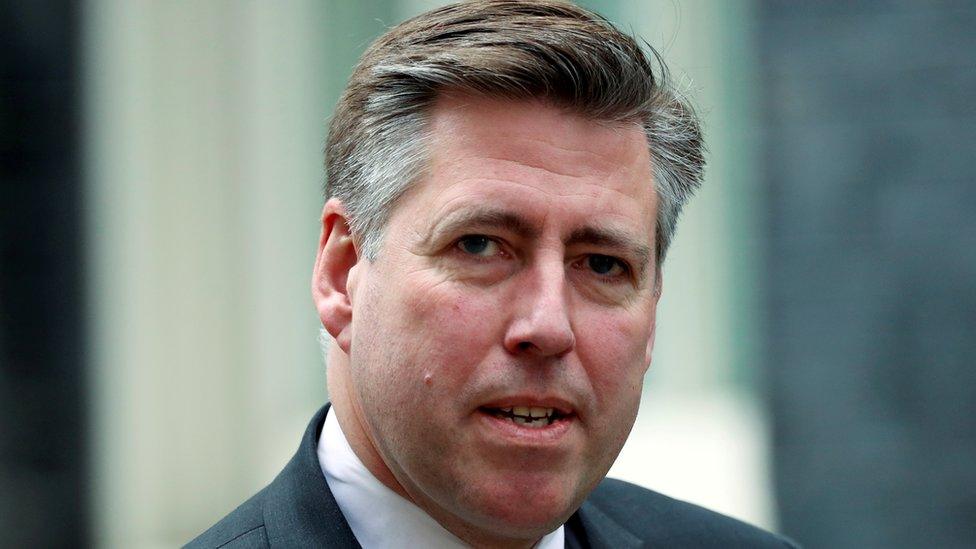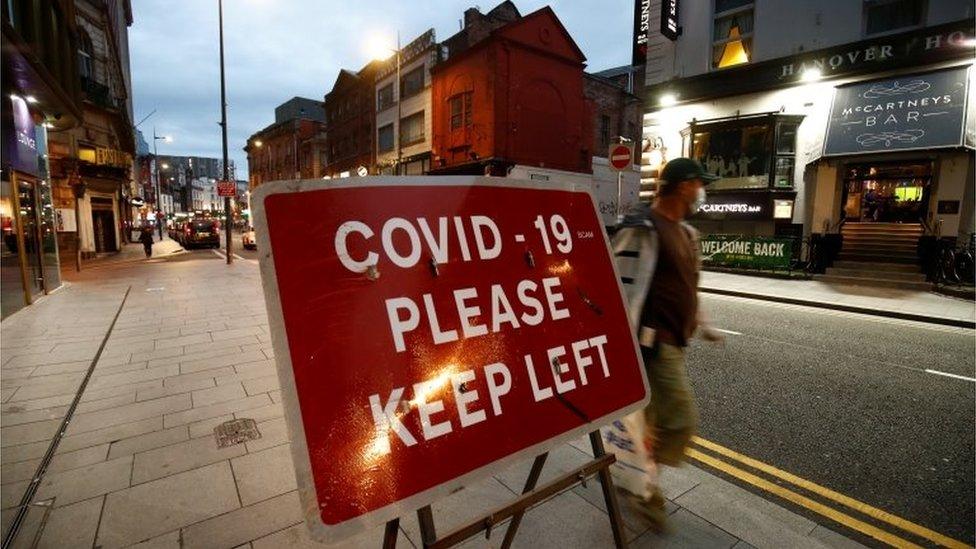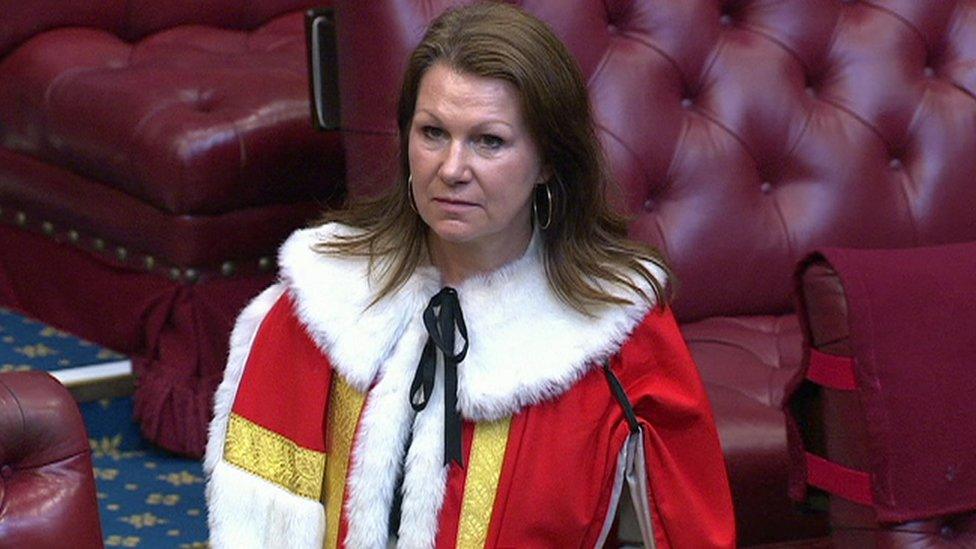Brady's 'win' shows Tory woe over Covid powers
- Published

Graham Brady has already won.
The chairman of the Conservatives' backbench 1922 Committee has demonstrated that he has the numbers to defeat the government if it carries on pushing through pandemic measures which restrict civil liberties, without consulting Parliament first.
Selected by the Speaker for debate or not, his amendment to the motion to keep the emergency powers in the Coronavirus Act going has done its job.
The more than 50 Conservatives who have signed it are enough to see the government lose, if they combine with opposition parties.
Leaving aside the irony of Brexiteer awkward-squaddie Jacob Rees Mogg having to negotiate with rebels, as Leader of the Commons, the fact of his discussions with Sir Graham tell you that he can count.
The Conservatives have a Commons majority of 80, over the combined forces of all the other parties (the Sinn Fein MPs don't take their seats, and the Speaker and his three deputies don't vote), so the magic number for a successful rebellion is 41 Tories defying the whip - assuming they then combine with every single opposition MP.
To be on the safe side, a rebel leader would need a few more backers, to compensate for illness or absence, or even the odd opposition maverick who might support the government.
On these figures Mr Brady has that.
He has more than 50 Conservatives behind him, plus the ex-Conservative independent Julian Lewis, and, significantly, DUP MPs like Gavin Robinson and Ian Paisley.
That matters, because if the government has a potential ally on the opposition side, it is the DUP with its eight MPs.
Not this time, it would appear.
And that's before you get to the impressive list of Labour supporters, including Harriet Harman, and John Cryer, Mr Brady's opposite number as the chair of the Parliamentary Labour Party.
When a government finds the shop steward for its own party and that of the main opposition ranged against it, red lights should be flashing.
Show of force
Wednesday's vote is on a motion that the temporary powers in the Coronavirus Act "should not yet expire."
That is the wording specified in the act - framed as a straight yes or no question - which means that Mr Speaker may not think it proper to allow an amendment to be put - and even if he did, and it passed, it is not clear that any amendment would carry legal force.
But the procedural nuances are by the by - what we have here is a show of force.
Ministers now know that concern about the pandemic restrictions has reached the level where they cannot rely on their majority.
Pretty much everyone in Parliament accepts that at the start of the pandemic, the government had to move fast to implement the lockdown and the measures around it - and some of the legislative weapons involved were inevitably rather blunt.
But Parliament has now been back for several months, and the sight of major restrictions on civil liberties, backed up by swinging fines, being signed into law by ministers in regulations - know as statutory instruments (SIs) - now grates on MPs across the parties.
In normal times, all kinds of regulations go through Parliament almost unnoticed, and usually with little more than perfunctory rubber-stamping.
Some can be "prayed against" - requiring them to be debated before they can take effect - others (called Made Affirmative Statutory Instruments) come into effect immediately, but do have to be debated after the event, usually within 28-40 sitting days.
According to the parliamentary think tank, the Hansard Society, 247 Coronavirus-related SIs have been laid before Parliament, 60 of them made affirmatives.
The list of SIs includes local lockdowns, mask-wearing regulations, extension of pre-trial custody, denial of prison visits, travel regulations, listing and de-listing exempt countries, and of course the fines for transgressors
So these are not trivial matters.
Some are made under the Coronavirus Act powers, and others derive from earlier public health legislation - but all have important effects on the economy and people's lives.
And some have been briefed out to the press days before they have been signed into law, yet have not been put before Parliament in the meantime.
Grady 'power-broker'
In the longer term, there may well be pressure to reform the mechanisms by which these things are done.
In the short term, the rebels will want a commitment from ministers to bring urgent measures before them - if at all possible, and to account for any urgent measures they have to take without reference to MPs at the dispatch box, at the first feasible moment.
They will also want more and earlier consultation.
Take next Tuesday's debate on the Health Protection (Coronavirus, Restrictions) (No. 2) (England) (Amendment) (No.4) Regulations 2020 - the fourth set of changes to the restrictions on gatherings, which came into force at 12.01am on 14 September and introduced the so-called rule of six.
They will have been in force for nearly a month by the time they are debated, but Parliament has been sitting the whole time and could easily have considered them before now.
Mr Brady's current eminence can be traced back to 2007, when he resigned as shadow minister for Europe, external in protest at then Conservative leader David Cameron's line on grammar schools. He was articulating a view shared by many backbench colleagues - and the result was a decade as chairman of the '22, the indispensable power-broker of the Tory backbenches.
He's just done it again - and if Boris Johnson felt the need to broaden the base of his government, he would not have to look far for an obvious (cabinet level) recruit.
- Published28 September 2020

- Published25 September 2020
- Published29 September 2020

